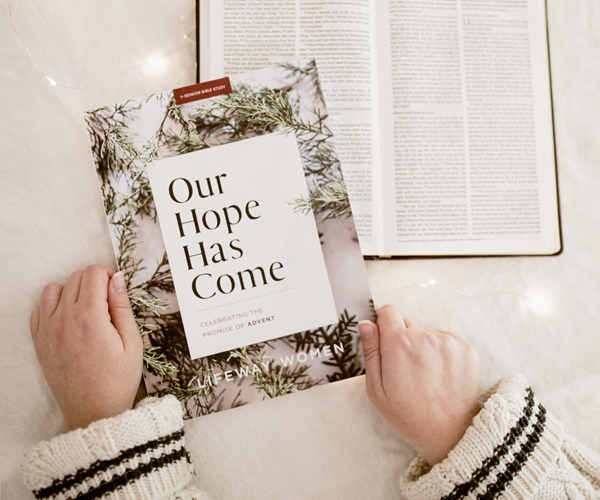Today we’re sharing an excerpt from Lifeway Women’s new Advent study, Our Hope Has Come. Order your copy or view a free sample at lifeway.com/hope.
When we read Luke’s account of the angel Gabriel’s visit to a young woman named Mary, we’ll miss a lot of the meaning if we’re unaware that the details of the encounter are loaded with references to stories of God’s history with His people recorded in the pages of the Old Testament. Growing up in a Jewish community in Nazareth, Mary’s identity would have been shaped by the stories she had heard told repeatedly. Her faith in God and her hope that He would ultimately fulfill His promises had been forged by her awareness of God’s revelation through His interactions with figures like Abraham, Sarah, and Moses.
Mary was likely familiar with the full import of being a recipient of God’s favor and presence. Jews well acquainted with the Torah (the first five books of the Bible) and Israel’s history knew that God’s favor rested on figures like Noah, Moses, and Gideon. Gideon was called to save God’s people by leading a select army against the Midianites. He was a reluctant but creative warrior who defeated an army of thousands with a few hundred men. In Israel men like these were revered because they were vessels through which God preserved His people.
But what about Mary? Mary was just a young woman from a rural village. She wasn’t a builder, a leader, a soldier, or a prophet. But she was a woman who believed the stories she had heard all her life about a God who kept His promises and rescued His people. She knew that He called ordinary people into His service and accomplished things through them that they could never have done in their own strength.
When Mary heard Gabriel’s stunning announcement that she was being called to bear a son who would establish an eternal kingdom, inheriting David’s throne and reigning “over the house of Jacob forever” (Luke 1:33), she didn’t ask if it would happen; she wondered how it could happen through her. Mary, like any faithful Israelite, would have expected a king to come as a fulfillment of the prophetic promises found in passages like 2 Samuel 7:9-16; Isaiah 9:6-7; and Daniel 7:13-14. But Mary almost certainly didn’t expect to be so intimately involved in God’s rescue plan. The particularity of this call— to mother the Son of God Most High—shattered her expectations.
Under the circumstances, “How can this be?” (Luke 1:34) was a very appropriate question. Mary’s query didn’t reveal doubt in God’s faithfulness; it likely reflected her amazement that He would call her to be a participant in His mission. And it revealed a practical concern: How could a virgin who had never been intimate with a man become a mother? Gabriel’s response to Mary alluded to the most famous miraculous birth in the history of Israel: the birth of Isaac to Sarah, a barren, geriatric mother (Gen. 21). The phrase, “For nothing will be impossible with God” (Luke 1:37), evokes Genesis 18:14 and the sharp reminder to Abraham and Sarah that nothing is too hard for God.
Blessed Mary. She said yes to God. Mary’s answer, “See, I am the Lord’s servant . . . May it happen to me as you have said” (Luke 1:38), is a resounding yes to God’s demanding call on her life. Her yes risked her reputation. Many would have assumed that she had been unfaithful to her betrothed husband, Joseph. Her yes risked the discomfort and dangers of pregnancy. She risked social isolation. Still, she said yes!
Mary’s yes encompassed more than her agreement to deliver and raise a child. Her yes included her affirmation of all this child was promised to be and accomplish. Her belief marks her as the first disciple of Christ. Belief is the beginning of a faithful life. The willingness to serve in any capacity assigned by God is the path of discipleship. Mary believed, embracing her calling as a servant of the Lord.
Get an inside look at a sample of the study here:
Here are some fun wallpapers for your desktop and phone! Click the images below to download!







